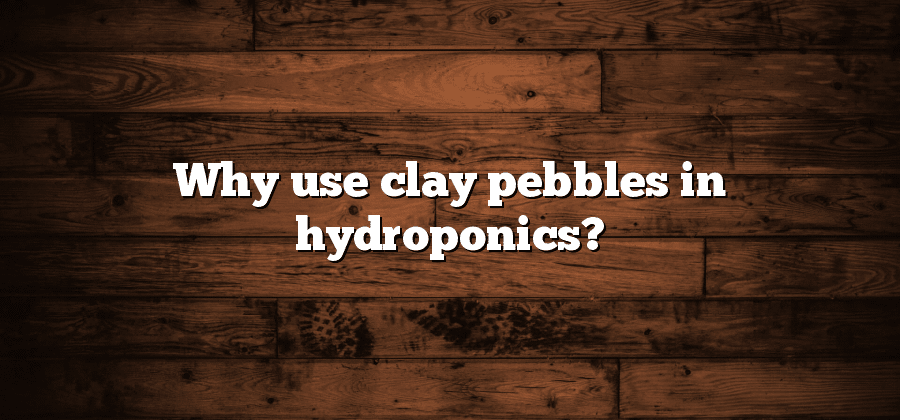Excellent Water Retention: Clay pebbles have high water-holding capacity.
Clay pebbles are widely recognized for their exceptional water retention capabilities, making them an ideal choice for hydroponic systems. These pebbles are able to retain a significant amount of water within their porous structure, ensuring a steady supply of moisture to the plants’ roots. This is particularly advantageous in hydroponic setups, where the absence of soil can make it challenging to maintain adequate moisture levels. With clay pebbles, growers can have peace of mind knowing that their plants will not suffer from water scarcity, even in arid or dry environments.
The high water-holding capacity of clay pebbles also contributes to the overall health and vitality of plants. By storing water within their structure, these pebbles provide a buffer against drought conditions, allowing plants to sustain themselves during periods of reduced water availability. Additionally, the ability of clay pebbles to retain water for extended periods of time means that growers can reduce the frequency of watering, saving time and resources in the process. This is especially beneficial for those who have limited access to water or are looking to optimize their hydroponic systems’ efficiency.
Optimal Drainage: These pebbles provide efficient drainage for hydroponic systems.
Optimal drainage is a crucial factor to consider when setting up a hydroponic system. Without proper drainage, excess water can accumulate around the roots, leading to oxygen deprivation and nutrient deficiencies. Clay pebbles offer a solution to this problem with their efficient drainage capabilities.
The porous nature of clay pebbles allows water to flow freely through the growing medium, preventing waterlogging and ensuring that the roots receive the necessary amount of oxygen. This promotes healthy root development and overall plant growth. Additionally, the drainage provided by clay pebbles helps to prevent the buildup of harmful chemicals and salts in the hydroponic solution, maintaining its quality and ensuring the plants receive the proper balance of nutrients.
In conclusion, the use of clay pebbles in hydroponic systems provides optimal drainage, allowing for a healthy growing environment for plants. Their ability to efficiently drain excess water not only prevents root rot but also promotes oxygen availability and maintains the pH balance of the hydroponic solution. If you are looking to optimize your hydroponic setup, clay pebbles are an excellent choice for achieving efficient drainage.
Enhanced Aeration: The porous nature of clay pebbles promotes oxygen availability to plant roots.
High levels of oxygen supply to plant roots are crucial for their healthy growth and development. Clay pebbles, with their inherent porous nature, play a crucial role in facilitating enhanced aeration in hydroponic systems. The pores present within the pebbles allow for the easy passage of oxygen, ensuring its availability to the roots.
By promoting oxygen availability, clay pebbles provide an ideal environment for root respiration, a process necessary for nutrient uptake and overall plant vitality. This enhanced aeration leads to stronger, more vigorous root systems, which in turn support optimal plant growth and productivity. Moreover, the improved oxygen supply helps in mitigating the risk of anaerobic conditions that can inhibit root growth and result in plant stress. The porous structure of clay pebbles, therefore, places them as a favorable medium for hydroponic systems, ensuring that plants receive the necessary oxygen for their growth.
pH Stability: Clay pebbles help maintain a stable pH balance in hydroponic solutions.
The pH balance plays a crucial role in the success of any hydroponic system. Clay pebbles, fortunately, are an excellent option for maintaining a stable pH level in the solution. This stability is achieved because clay pebbles do not have any significant effect on the pH value. They act as a neutral medium, ensuring that the hydroponic solution maintains its desired acidity or alkalinity without any fluctuations. This allows plants to absorb nutrients optimally, leading to healthy growth and development.
Furthermore, unlike other types of hydroponic media, clay pebbles possess the ability to buffer pH levels. They can absorb excess acid or alkali, helping to stabilize the pH of the solution. This buffering effect is especially useful in systems where the pH fluctuates frequently. As a result, using clay pebbles not only promotes a stable pH balance but also reduces the need for frequent adjustments, making it easier for hydroponic growers to maintain the ideal growing conditions for their plants.
Reduced Risk of Root Rot: The superior drainage properties of clay pebbles prevent waterlogging and root rot.
Clay pebbles offer an effective solution to mitigate the risk of root rot in hydroponic systems. One of the primary causes of root rot is waterlogging, where excessive water accumulates around the roots, depriving them of essential oxygen. However, the superior drainage properties of clay pebbles help prevent this issue by allowing excess water to flow freely through the growing medium. As a result, the roots have a constant supply of oxygen, promoting healthy growth and reducing the chance of root rot occurring.
Furthermore, the porous nature of clay pebbles enhances aeration within the hydroponic system. This means that the roots receive ample oxygen, critical for their respiration and overall growth. The high porosity of clay pebbles creates air pockets within the growing medium, facilitating the exchange of gases between the roots and the surrounding environment. As a result, the roots remain healthy and are less susceptible to the conditions that promote the development of root rot.






